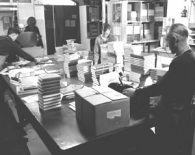Text Book Branch

Image: British Columbia Archives I-00430
The Free Text-Book Branch acquired textbooks from publishers and each year a certain number of the books were "loaned" to pupils. The branch also provided classroom supplies (such as stationery, maps, and globes) and flags to schools. Initially, the branch only served elementary schools but by 1910 it was providing books and equipment to superior schools, high schools, and night schools.
The Free Text-Book Branch was renamed the Text-Book Branch in 1932. The name was altered to indicate a change in the functions of the branch. Although the branch continued to issue a certain number of free textbooks and school supplies, after 1932 it became the sole purchaser of all textbooks used in provincial schools. Books which were not on the branch's "free-list" were resold to commercial dealers. The dealers in turn could sell the books to pupils but only at prices which did not exceed an amount set by the Text-Book Branch.
David Wilson, a former school inspector, was the first Officer-in-Charge of the branch. He conducted the branch until he retired in 1920. Wilson was an ardent proponent of school libraries and under his direction the branch helped school districts acquire reference works and other library stock. Wilson's successors — J. L. Watson (1920-1921), J. A. Anderson (1921-1931) and P. G. Barr (1932-1960) — were similarly committed to developing school libraries. In conjunction with the Public Library Commission (1919), they helped to establish school and community libraries in many rural districts.
The Royal British Columbia Museum has an extensive collection of prescribed textbooks and authorized supplementary readers. The Curriculum Library in the Faculty of Education at The University of British Columbia in Vancouver also holds a large number of historical textbooks. A smaller but representative collection of school readers is available at the Curriculum Laboratory at the University of Victoria.
Written by Patrick A. Dunae

